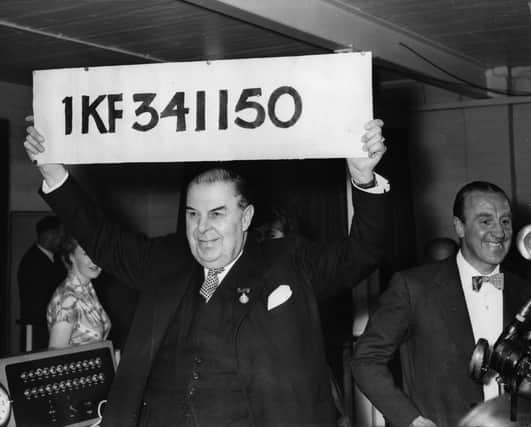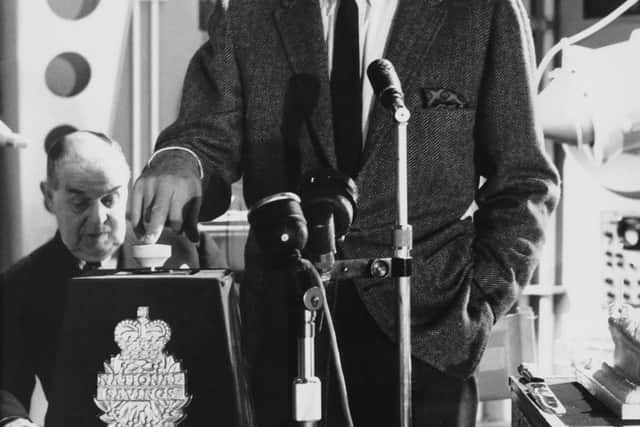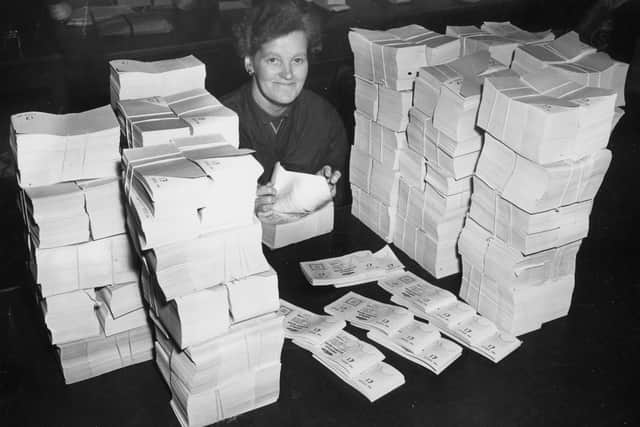Remembering the weekly ritual of checking the premium bonds on ‘Ernie’


Premium Bonds were not the first example of institutionalised gambling in Britain – the football pools had been around for more than 30 years when on November 1, 1956 the first bonds went on sale. Harold Macmillan, then Chancellor of the Exchequer, launched them with due pomp in Trafalgar Square, as a way to control inflation and encourage saving in the post-war world.
On the first day alone, £5m of bonds were sold, and these pictures from the archive recall the near hysteria induced when the early numbers were drawn.
Advertisement
Hide AdAdvertisement
Hide AdThe Post Office created what it called its Electronic Random Number Indicating Equipment – Ernie for short – for the purpose, at the Premium Savings Bonds office in Lytham St Annes, near Blackpool.


The top prize in 1956 was £1,000 – about £25,000 in today’s money – and the maximum permitted investment was £500. But unlike most savings schemes, the bonds accrued no interest – you either won or you didn’t.
Perhaps for that reason, they were not universally popular. The shadow Chancellor, Harold Wilson, called them “a squalid raffle” and a “national demoralisation”, and some church leaders warned their flocks not to take part, fearing that Britain would become a nation of gamblers. However, the legalisation of betting shops, four-and-a-half years later, made premium bonds seem like money in the bank.
Despite the competition from both banks and the lottery, and their somewhat lower profile, premium bonds continue to be popular, with some 23m small investors hoping for a shot at the £1m top prize. But most payouts are of a more modest £25. The chance of winning is said to be 36,000 to one.
Advertisement
Hide AdAdvertisement
Hide AdEditor’s note: first and foremost - and rarely have I written down these words with more sincerity - I hope this finds you well.


Almost certainly you are here because you value the quality and the integrity of the journalism produced by The Yorkshire Post’s journalists - almost all of which live alongside you in Yorkshire, spending the wages they earn with Yorkshire businesses - who last year took this title to the industry watchdog’s Most Trusted Newspaper in Britain accolade.
And that is why I must make an urgent request of you: as advertising revenue declines, your support becomes evermore crucial to the maintenance of the journalistic standards expected of The Yorkshire Post. If you can, safely, please buy a paper or take up a subscription. We want to continue to make you proud of Yorkshire’s National Newspaper but we are going to need your help.
Postal subscription copies can be ordered by calling 0330 4030066 or by emailing [email protected]. Vouchers, to be exchanged at retail sales outlets - our newsagents need you, too - can be subscribed to by contacting subscriptions on 0330 1235950 or by visiting www.localsubsplus.co.uk where you should select The Yorkshire Post from the list of titles available.
Advertisement
Hide AdAdvertisement
Hide AdIf you want to help right now, download our tablet app from the App / Play Stores. Every contribution you make helps to provide this county with the best regional journalism in the country.
Sincerely. Thank you.
James Mitchinson, Editor
Comment Guidelines
National World encourages reader discussion on our stories. User feedback, insights and back-and-forth exchanges add a rich layer of context to reporting. Please review our Community Guidelines before commenting.